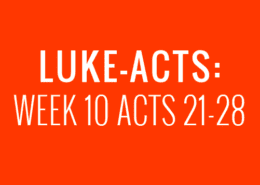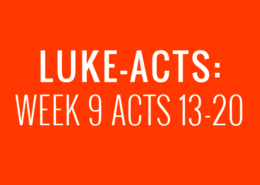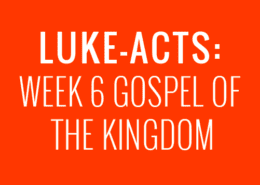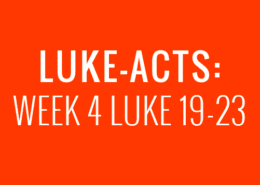
LUKE-ACTS: WEEK 2 LUKE 3-9
START BY TALKING ABOUT LUKE AND ACTS.
The Gospel of Luke begins in chapters 1 and 2 by telling readers about the births of John the Baptist and Jesus of Nazareth. Then we see Luke document how Jesus expands God’s kingdom and covenant by creating a new Israel that includes the poor, outcasts and others, to whom Jesus brings restoration and reverses their life circumstances as He gives them freedom and release from the tyranny of evil and sin. If you have not challenged your audience to be reading Luke, please do (next week we will cover chapters 9-19). Remember, we want to encourage people to be spending time with God and studying their bible.
Watch the video from us.
Review the notes below.
Jesus goes to John to be baptized and God gives His stamp of approval to Jesus and to the baptism. God said, “You are my son whom I love. With you I am well pleased.” This echoes the Old Testament in Psalm 2, where God promised that a king would come to rule the nations. It also echoes Isaiah 42, which describes the Messiah – Jesus – as a “suffering servant” who would die on Israel’s behalf.
After this Jesus was led into the wilderness by the Holy Spirit to be tempted by the devil for forty days with no food. Here, Jesus replays Israel’s forty-year journey through the wilderness, and instead of failing to trust God like Israel did. Jesus succeeds by trusting God and overcoming temptation. This marks Jesus as the one who is going to carry Israel’s story forward.
Next, Jesus returns to Nazareth, his hometown, and reads from the Book of Isaiah in his home synagogue. He reads a part about bringing, “good news to the poor.” In Hebrew culture, poverty wasn’t just about the money in your bank account, but your social status. The idea is about being a social outcast or outsider. By turning to this passage, Jesus was saying he was there for those people. Jesus freed people from their diseases and sicknesses, their shame, their pasts, and their sin. He freed them so they could be in God’s new kingdom Jesus said He was bringing into reality.
Jesus appointed twelve men to be his closest disciples. These men came from vastly different backgrounds. But Jesus brought them together anyway. In God’s new kingdom, everyone, regardless of their age, race, sex, background, social standing, or anything else, is called to live in unity as citizens of the Kingdom of God.
Jesus taught his followers to be generous and forgiving (even to people they didn’t like!) and to seek mercy and reconciliation with all. This was a radical way of life then, and it still is today. Jesus promised to lead the way in these radical teachings by being generous, forgiving, and reconciliatory himself. The ultimate proof of this was his sacrifice on the cross.
The last story in Luke 3-9 is called the Transfiguration. Here, Jesus takes His inner circle – Peter, James, and John – to the top of a mountain. Jesus is “transfigured” into a heavenly, or glorious, version of himself, and the Old Testament prophets Moses and Elijah appear with Him. God then speaks from the cloud: “This is my son – listen to him!” Jesus is the ultimate prophet. He is not merely the proclaimer of God’s word to Israel; he is God’s word to Israel.
Key Points
- Jesus goes to John to be baptized and God gives his stamp of approval to Jesus and to the baptism.
- Jesus replays Israel’s forty-year journey through the wilderness, and instead of failing to trust God like Israel did, Jesus succeeds by trusting God and overcoming temptation.
- Jesus read about proclaiming freedom and the year of the Lord’s favor. Jesus freed people from their diseases and sicknesses, their shame, their pasts, and their sin.
- Jesus appointed twelve men to be his closest disciples. These men came from vastly different backgrounds.
- Jesus is “transfigured” into a heavenly, or glorious, version of himself, and the Old Testament prophets Moses and Elijah appear with him.
Talk About It
- In what ways do people try to start over with God today?
- What is the significance of Jesus “replaying” or “redoing” some of the events the nation of Israel went through?
- Why does it matter that Jesus specifically came for the poor, the outcast, and downtrodden? What does this teach us about God?
- What does it mean that Jesus came to proclaim freedom for the captive? What does it mean to be a part of his “new kingdom?”
- What are some of Jesus’s hard teachings that are not always easy for you to follow or agree with?
- Why is it important that Jesus not merely taught us, but demonstrated for us, how to live as citizens of God’s new kingdom?
- Think about the two times God spoke about Jesus to give his stamp of approval. What is significant about these two events?
Helpful Resources
The Bible Project:












